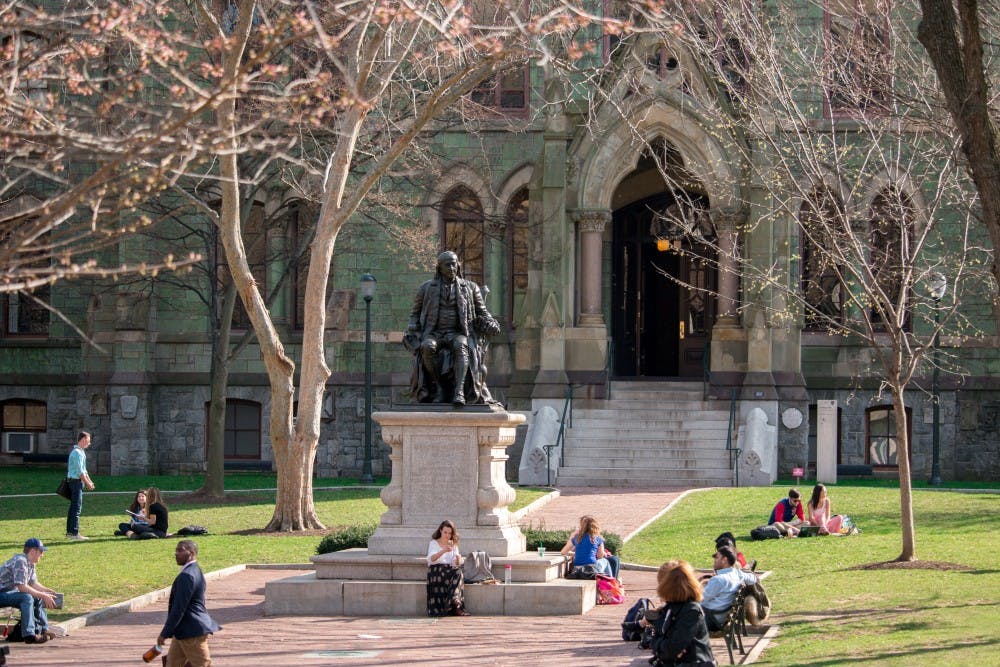
Voting for the Undergraduate Assembly opened on March 30 at midnight. Results will be announced at 9 p.m. on Friday, April 1.
Credit: Julio SosaIn the midst of a contentious election cycle featuring an infamous Wharton alumnus, three Penn students are also running for president — president of the Undergraduate Assembly of Penn, that is.
On Saturday morning, three candidates hoping to be Penn’s next UA president introduced their platforms and discussed the role of the UA in the first debate of the election cycle. The debate, moderated by Wharton senior and NEC Vice Chair for Education Devin Grossman, kicked off a week of debates and campaigning that will conclude with the close of student voting on Friday evening.
College junior and UA Treasurer Kat McKay is running alongside College sophomore and Vice Presidential candidate Sola Park. Just by running together, the two are the already breaking with tradition as the first ever all-female ticket for the UA. During the debate, McKay emphasized the importance of female leadership to achieve inclusion at Penn — of the 44 leaders of UA since it’s creation in 1972, only eight have been women and there are currently no female class board presidents.
Meanwhile, current College junior and UA Vice President Ray Clark hopes to continue his momentum as a leader in the UA by running alongside Wharton and College junior and former UA Secretary Andrew Gegios.
Unlike his two opponents, both of whom have held positions on the UA’s Executive Board, Engineering junior Ahmed Mohieldin — currently a member of the UA Steering Committee, but not the Executive Board itself — thinks his relative inexperience in the UA could be an asset for him and his running mate, College junior Taylor Becker.
“Coming in with fresh eyes to how the UA works is really, really important,” he said.
Though candidates differed in their experience in student government, all three echoed the need for increasing awareness about the UA’s mission to the student body.
Mohieldin advocated polling students to collect data about their preferences at Penn. He also advocated for “leaving formality at the door,” promoting a more transparent relationship between the UA and the student body and creating a master directory of student services.
“The UA is explicitly designed to represent the students and fight for you and people don’t know what it is,” Mohieldin said. “The UA needs to come to the students.”
McKay suggested changing the location of UA meetings, which are open to all Penn students, to Huntsman Hall, a central location on campus. Clark proposed engaging with students on Locust Walk, which he has done in the past as a member of the UA Executive Board. Clark also advocated holding meetings with individual students to connect the UA to their constituents.
“A metric for success is actually hearing the student voice,” Clark said. “If there are people left out of the conversation, then we don’t have an effective UA.”
The Commission on Undergraduate Assembly Debates prepared questions on a range of topics, including the balance of addressing the needs of the student body and the administration in UA practice.
Mohieldin underscored the role of the UA to further empower student voices while remaining collaborative with administrators.
“Right now, the UA is more a mouthpiece for the administration to the students,” he said, “rather than from the students to the administration.”
McKay said that “fostering a campus climate where people feel comfortable being whatever kind of person they are” is central to her campaign. She prioritized open expression, accountability of the administration for rising tuition, innovative academics and the need for increased productivity in the UA.
Clark, meanwhile, prioritized his ideas for student wellness. He suggested “revamping” the UA Wellness Guide, which was designed by his running mate, and stressing its availability to all students.
“It’s really important to see how the pre-professional culture here impacts the students on an everyday basis,” he said.
Grossman said one of the functions of the UA debates is to create a level platform for campaigning regardless of candidate’s ability to publicize their agenda or design a website.
“It provides an equal-opportunity forum for campaigning,” he said. “It makes the election cycle more substantive and engaging.”
Following protocol, the first debate was not open to a student audience. However, the next two debates this week will include student audiences as well as representatives from endorsing groups and vice presidential candidates.
The Daily Pennsylvanian is an independent, student-run newspaper. Please consider making a donation to support the coverage that shapes the University. Your generosity ensures a future of strong journalism at Penn.
DonatePlease note All comments are eligible for publication in The Daily Pennsylvanian.




